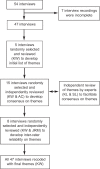A qualitative study of patients' goals and expectations for self-management of COPD
- PMID: 23138844
- PMCID: PMC3745027
- DOI: 10.4104/pcrj.2012.00070
A qualitative study of patients' goals and expectations for self-management of COPD
Abstract
Background: Chronic obstructive pulmonary disease (COPD) is an illness that affects patients on multiple levels, both physically and psychologically. While there is a growing body of evidence for the efficacy of self-management among patients with COPD, little evidence is available on the optimal content and methods for delivering self-management support.
Aims: The purpose of this study was to address gaps in the literature on self-management support by examining patients' responses to questions about goals, needs, and expectations regarding self-management using qualitative methods in a broadly representative sample of patients with moderate to severe COPD. By focusing on patients' perceptions of their needs, we hoped to guide development of cognitive-behavioural interventions for self-management support.
Methods: Patients >45 years of age with a physician diagnosis of COPD were recruited as part of a larger randomised controlled trial designed to determine the effectiveness of a lifestyle behavioural intervention to increase physical activity. In-depth interviews were conducted at baseline data collection using 10 standardised open-ended questions tailored to examine factors relevant to self-management support including concerns, fears, learning needs, barriers, facilitators, and goals. All interviews were audio recorded and analysed using qualitative methods. Responses were coded by three raters into thematic categories.
Results: A sample of 47 interviews with patients of mean age 68.4 years, 53% male, 87% white were used in the analysis. The distribution of spirometric impairment based on percent predicted forced expiratory volume in 1 second (FEV1) was moderate (57.5%), severe (31.9%), and very severe (10.6%). In response to questions targeting needs and goals for care, three main themes (loss, fear, and desire for improved care) and seven associated sub-themes were identified. Because of breathlessness and fatigue as well as symptoms from conditions other than COPD, patients reported the loss of ability to participate in pleasurable and necessary activities of daily living and the desire to recover at least some of their functioning. They expressed problems with social isolation and uncertainty about their prognosis, as well as the hope to improve. In addition, fearful experiences associated with uncontrolled breathlessness and a wish for greater understanding and knowledge about treatment were major concerns.
Conclusions: These qualitative results suggest that the content of self-management support for patients with COPD should focus on addressing patients' fears associated with the uncertainty, progression, and suffering of their disease, their expectations about overcoming or replacing losses, their needs for improved health literacy and their desire for improved care. These responses indicate areas where cognitive-behavioural intervention should focus in order to enhance patient self-efficacy, motivation, and behavioural change for improved self-management.
Conflict of interest statement
The authors declare that they have no conflicts of interest in relation to this article.
Figures
Comment in
-
Pulmonary rehabilitation and qualitative research.Prim Care Respir J. 2013 Jun;22(2):148-0. doi: 10.4104/pcrj.2013.00045. Prim Care Respir J. 2013. PMID: 23666717 Free PMC article. No abstract available.
References
-
- The Global Initiative for Chronic Obstructive Lung Disease (GOLD) 2011. Available from: http://www.goldcopd.org/ (accessed 16 Jan 2012).
-
- Heffner JE, Mularski RA, Calverley PM. COPD performance measures: missing opportunities for improving care. Chest 2010;137(5):1181–9. http://dx.doi.org/10.1378/chest.09-2306 - PubMed
-
- Frieden TR. A framework for public health action: the health impact pyramid. Am J Public Health 2010;100(4):590–5. http://dx.doi.org/10.2105/AJPH.2009.185652 - PMC - PubMed
-
- Coleman K, Austin BT, Brach C, Wagner EH. Evidence on the chronic care model in the new millennium. Health Affairs 2009;28(175):76–85. http://dx.doi.org/10.1377/hlthaff.28.1.75 - PMC - PubMed
-
- Institute of Medicine (IOM). Priority areas for national action: transforming health care quality. Washington, DC: National Academy Press, 2003. Available from: http://www.iom.edu/Reports/2003/Priority-Areas-for-National-Action-Trans... (accessed 16 Jan 2012). - PubMed
Publication types
MeSH terms
Grants and funding
LinkOut - more resources
Full Text Sources
Medical

